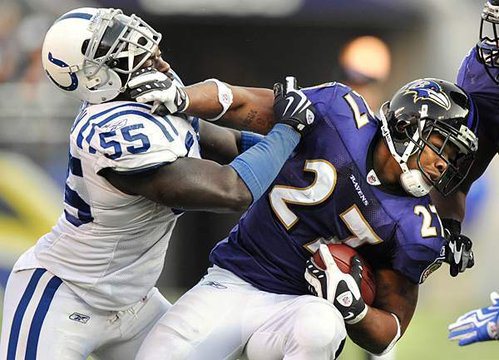Sometimes compelling national news occurs at just the time one is teaching related subject matter. As the media was showing the horrifying images of Baltimore Ravens running back Ray Rice knocking out his girlfriend in an elevator, my Restoration and 18th Century class was studying rake culture in the time of Charles II. A major poet from that time period—John Wilmot, the Earl of Rochester—gives us insight into why Rice behaved as he did.
The age was less apologetic than our own about beating up women. In Wilmot’s poem “The Disabled Debauchee,” for instance, we see an aging libertine talking proudly of assaulting prostitutes:
Or should some cold-complexioned sot forbid,
With his dull morals, our bold night-alarms,
I’ll fire his blood by telling what I did
When I was strong and able to bear arms.
I’ll tell of whores attacked, their lords at home;
Bawds’ quarters beaten up, and fortress won;
Windows demolished, watches overcome;
And handsome ills by my contrivance done.
Wilmot himself once “beat up” what he thought was a brothel, although he was misled and instead attacked a constable’s house. One of his friends was killed in the encounter, leading him to later write,
Frighted at my own mischiefs I have fled,
And bravely left my life’s defender dead;
Broke houses to break chastity, and dyed
That floor with murder which my lust denied…
Wilmot is not endorsing the “heroic exploits” of the disabled debauchee—the man is pathetic, not heroic—and the poet was more sensitive to women’s needs than many men of his time. Nevertheless, even Wilmot is far more interested in male honor and in male solidarity than in the lives of women. In his view, women just play games with honor while male honor is what makes life worth living:
Consider Real Honour then,
You’ll find Hers cannot be the same;
‘Tis noble Confidence in Men,
In Women mean mistrustful Shame.
Just as Rice was an exemplary teammate, so did Wilmot find greatest pleasure in the company of other men. In “Love a woman? You’re an ass,” Wilmot retreats to male comradery because he feels uncomfortably vulnerable around women:
Farewell, woman! I intend
Henceforth every night to sit
With my lewd, well-natured friend
Drinking to engender wit.
In “To a Lady in a Letter,” meanwhile, Wilmot is willing to have his mistress sleep with other men as long as she allows him to drink with his buddies:
Let us (since wit has taught us how)
Raise pleasure to the Top
You Rival Bottle must allow
I’ll suffer Rival Fop.
We see Wilmot’s discomfort with female intimacy in “The Imperfect Enjoyment,” where the speaker feels less of a man when he is unable to make love to a woman he admires. He first vents his fury against his own offending member and then concludes with the disturbing image of the woman being subjected to “ten thousand pricks”:
And may ten thousand abler pricks agree
To do the wronged Corinna right for thee.
I’m not entirely sure how to take this concluding couplet but it sounds as though Wilmot is using an image of female humiliation and possibly gang rape to restore male pride. The point is that the speaker feels a fury at being unmanned and a woman bears the brunt.
Rice, accustomed to dominating in the ultra-violent sport of American football, resorted to inappropriate violence when someone who knew him intimately threw him off balance. His career is over because he did not know how to behave correctly on this other playing field. He’s far from the only man to resort to his physical superiority when at a loss. It’s why we must all stop glorying in male power and become sensitive.



2 Trackbacks
[…] Thursday I compared 17th century rake culture and the male anxieties of poet John Wilmot with the macho culture of the […]
[…] for consistency. As it is now, Commissioner Roger Goodell appears to be winging it. In the case of running back Ray Rice, for instance, Goodell decreed one punishment and then, when an elevator tape of Rice hitting his […]